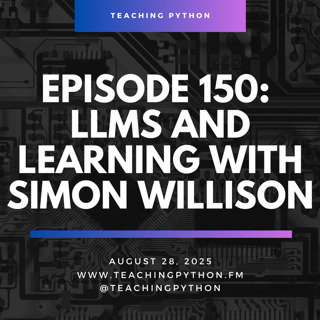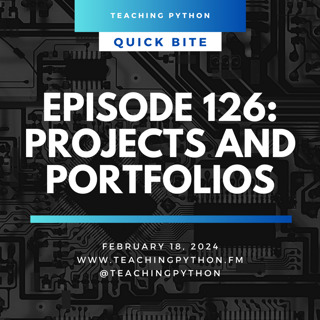
Episode 126: Projects and Portfolios
In Episode 126 of the "Teaching Python" podcast, hosts Sean Tibor and Kelly Schuster-Paredes delve into the fascinating realm of projects and portfolios for young coders. Expanding on the importance of showcasing coding skills, they explore how portfolios act as a powerful tool to demonstrate creativity, discipline, and coding standards. By creating a portfolio, students can present a comprehensive view of their work, allowing others to peek into their coding thought process and evaluate their unique voice as programmers. Sean and Kelly discuss how portfolios can give young coders a competitive edge when it comes to college admissions and job applications. They emphasize the significance of going beyond traditional academic achievements, such as grades and test scores, and highlight the value of tangible evidence of their coding prowess. By curating a collection of their projects, students not only provide a window into their technical abilities but also provide important context about their inspirations, intentions, and the thought process behind each project. Moreover, the hosts discuss the benefits of contributing to open-source projects and sharing code on platforms like GitHub. They acknowledge the initial discomfort, but encourage young coders to take the leap and submit contributions, highlighting how these experiences can enhance their portfolios and provide valuable talking points in interviews. Additionally, they discuss the emerging trend of universities and employers conducting online background checks, making a well-crafted online presence, including portfolios and LinkedIn profiles, essential for young coders. In this insightful episode, Sean and Kelly provide practical advice, personal anecdotes, and valuable insights, helping young coders understand the significance of projects and portfolios in their educational and professional journeys. Tune in to gain valuable tips on standing out, showcasing your skills, and navigating the world of coding portfolios and projects!
19 Helmi 202425min
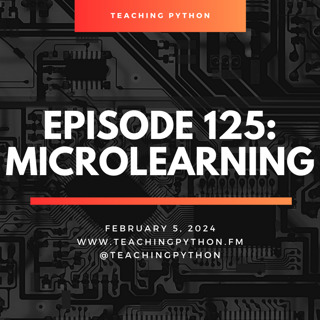
Episode 125: Microlearning
In episode 125 of Teaching Python, hosts Sean Tibor and Kelly Schuster-Paredes dive into the concept of micro learning, discussing its benefits in fostering long-term memory retention and profound comprehension. The hosts advocate formalizing micro learning--breaking down topics into approachable, bite-sized segments--and discuss its application in the move towards more immediate, more specific, and ultimately more impactful and rewarding feedback. The discussion also covers the idea of 'laddering' a series of micro learning experiences to achieve larger, long-term objectives, the value of diverse learning materials, and even the role of badges and credentials in incentivizing continuous education. 00:00 Introduction to the Podcast 00:11 Exploring the Concept of Micro Learning 01:02 Understanding Macro Learning 01:11 The Evolution of Education 04:46 The Role of Micro Learning in Professional Development 05:56 The Methodology of Micro Learning 06:12 Micro Learning in the Classroom 08:49 The Benefits of Micro Learning 21:00 The Importance of Feedback in Micro Learning 28:30 The Role of Gamification in Micro Learning 33:40 Conclusion: The Future of Micro Learning
5 Helmi 202436min
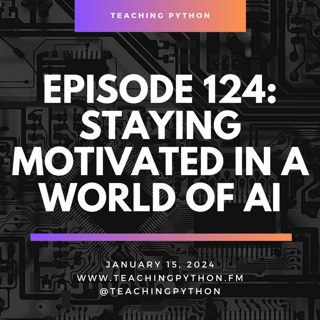
Episode 124: Motivated with Coding in the World of AI
In this episode, Sean and Kelly focus on maintaining engagement in a pedagogical and professional setting during interaction with AI. They share meaningful anecdotes from their respective fields, offering a variety of methods to increase productivity and interest. Kelly, as an educator, discusses including the students in the technology integrations by letting them understand and contribute to the process. Sean, from a developer perspective, emphasizes on the importance of accountability, leaning into external relationships, having more concrete definitions of tasks, and stepping away when needed for better productivity.
14 Tammi 202449min
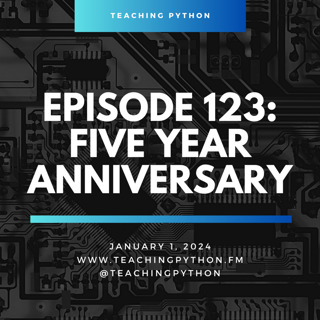
Episode 123: Five Year Anniversary
In this commemorative episode, Kelly and Sean celebrate their fifth year at Teaching Python. They reflect upon the origins of the podcast, how it has evolved, successes and challenges they've faced, and valuable lessons learned over the years. This episode underscores the importance of embracing continued learning, of staying persistent, and validates the magic of teaching and learning alongside students.
2 Tammi 202438min
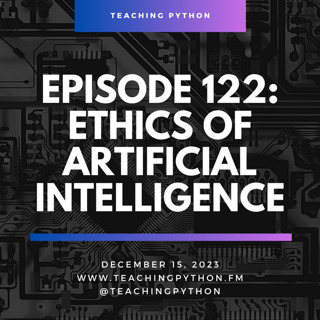
Episode 122: Ethics of Artificial Intelligence
In Episode 122 of Teaching Python, hosts Sean Tibor and Kelly Schuster-Paredes, explore the multifaceted role of AI in society together with their special guest, Cecilia Danesi. An expert in AI ethics and social impact, Cecilia shares in depth knowledge and interesting insights on the influence AI wields in different aspects of society. The episode covers a broad range of topics underlining the importance of AI in education, the concerns around algorithmic bias, the hard-hitting implications of irresponsible AI usage, the challenges and responsibilities shouldered by educators, among others. Tune in for an eye-opening episode ensuring a broader understanding of AI and the ethical standards required in its use. Special Guest: Cecilia Celeste Danesi.
16 Joulu 202332min
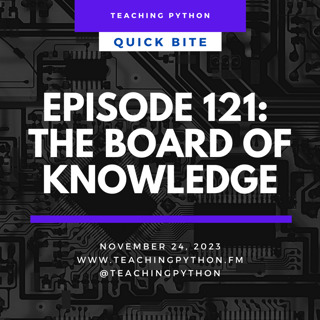
Episode 121: The Board of Knowledge
In this episode of Teaching Python, hosts Sean Tibor and Kelly Schuster-Paredes dive into the world of teaching coding with their special guest, the Board of Knowledge. This unique teaching tool, a large whiteboard spanning the back wall of their computer science classroom, is a visual representation of coding concepts and serves as a valuable resource for sixth graders. Sean and Kelly explore how the Board of Knowledge reduces cognitive load, scaffolds learning, and utilizes dual coding techniques to enhance students' understanding of coding principles. They also discuss the benefits of having a communal set of shared knowledge and the impact it has on students' learning experience. Tune in to discover how this innovative teaching tool can transform your coding lessons!
24 Marras 202316min
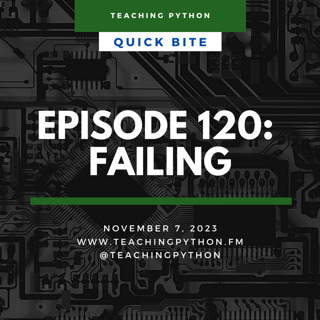
Episode 120: Quick Bites: Failing
Episode 120: The Role of Failure in Learning In this episode of the Teaching Python podcast, co-hosts Sean Tibor and Kelly Schuster Paredes discuss the significance of failure in learning. They assert that failure is a crucial part of development and growth, providing an opportunity to be resilient and persistent when things don't go to plan. Sean shares a personal experience where he turned a coding failure into a learning opportunity, evolving better testing principles. Also, they discuss the need for a secure environment to allow for failure and learning. They conclude by introducing their community partnership with Python Tutor, a tool that helps in visualizing Python code execution.
8 Marras 202318min
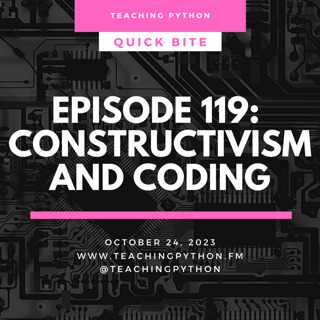
Episode 119: Quick Bites: Constructivism and Coding
In this episode of our teaching series, we dive into learners and their coding journey. We spotlight the Constructivist learning approach, emphasizing its core tenets: active learning, connecting coding to real-world challenges, the crucial role of collaboration, and the sheer power of motivation. The transformative potential of this approach is undeniable. From tales of initial struggles to triumphant victories, this episode is a 15-20 minute dive into the heart of teaching Python.
24 Loka 202322min
